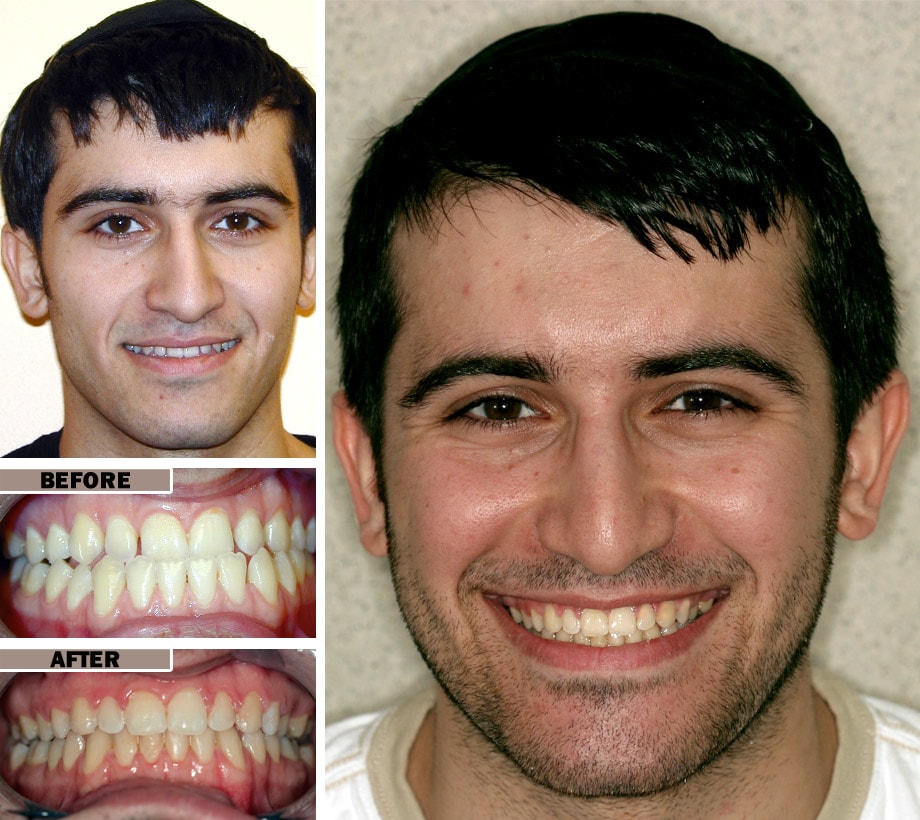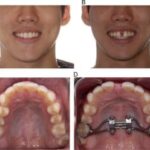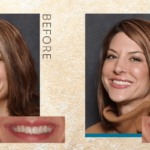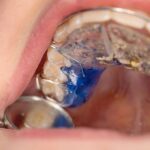Having a properly aligned upper jaw is not only important for a beautiful smile, but it also plays a crucial role in overall oral health. However, many individuals may have a narrow upper jaw, which can lead to various issues such as crowded teeth, difficulty breathing, and even sleep apnea. Fortunately, there are several techniques available to expand the upper jaw and improve both the aesthetics and functionality of the mouth.
One of the most common techniques used to expand the upper jaw is a palatal expander. This device is custom-made to fit the roof of the mouth and gradually widens the upper jaw by applying gentle pressure. The palatal expander is typically worn for a few months and can significantly increase the width of the upper jaw, creating more space for the teeth to properly align.
Another technique that is often used to expand the upper jaw is a surgically assisted rapid palatal expansion (SARPE). This procedure is typically recommended for individuals who have reached skeletal maturity and have a narrow upper jaw that cannot be corrected with a palatal expander alone. SARPE involves making small incisions in the roof of the mouth and using a special device to gradually widen the upper jaw. This technique can be highly effective in expanding the upper jaw and improving both the aesthetics and functionality of the mouth.
Palatal Expansion: A Non-Invasive Method
Palatal expansion is a non-invasive method used to expand the upper jaw. This procedure is often recommended for individuals with a narrow palate or a crossbite, where the upper teeth do not align properly with the lower teeth.
During palatal expansion, a dental professional will use a device called a palatal expander to gradually widen the upper jaw. The expander is typically attached to the molars and is adjusted regularly to achieve the desired expansion. This process is painless and does not require any surgery.
The Benefits of Palatal Expansion
Palatal expansion offers several benefits for individuals with a narrow upper jaw:
1. Improved Breathing and Sleep Quality: By expanding the upper jaw, palatal expansion can help open up the airways, reducing the risk of breathing difficulties and improving sleep quality.
2. Enhanced Facial Appearance: A narrow upper jaw can affect the overall facial symmetry. Palatal expansion can help create a more balanced and aesthetically pleasing facial profile.
3. Better Chewing and Digestion: With a wider upper jaw, there is more space for the teeth to properly align, improving chewing efficiency and digestion.
4. Prevention of Dental Problems: Palatal expansion can help prevent dental issues such as crowding, misalignment, and impacted teeth by creating more space in the upper jaw.
5. Increased Space for Permanent Teeth: Palatal expansion is often performed in children to create more space for permanent teeth to erupt properly.
6. Improved Speech and Pronunciation: A narrow upper jaw can affect speech and pronunciation. Palatal expansion can help alleviate these issues by creating more space for the tongue and improving tongue placement.
7. Reduced Risk of Temporomandibular Joint Disorders: By aligning the upper and lower teeth properly, palatal expansion can help reduce the risk of temporomandibular joint disorders, which can cause jaw pain and dysfunction.
Surgical Jaw Expansion: A Permanent Solution
Surgical jaw expansion is a permanent solution for expanding the upper jaw and correcting issues related to a narrow palate. This procedure is typically recommended for individuals with severe crowding, crossbite, or breathing difficulties due to a narrow jaw.
The surgical jaw expansion procedure involves making small incisions in the upper jawbone and inserting a device called a distractor. The distractor gradually widens the jawbone by applying gentle pressure over a period of time. This allows the bone to adapt and create additional space for the teeth and improve the overall alignment of the jaw.
Surgical jaw expansion offers several benefits. Firstly, it provides a permanent solution for correcting jaw alignment issues. Unlike other methods that may require ongoing maintenance, surgical jaw expansion permanently widens the jawbone, creating lasting results.
Additionally, surgical jaw expansion can improve breathing and sleep quality. By widening the upper jaw, it creates more space for the airway, reducing the risk of breathing difficulties such as snoring and sleep apnea. This can lead to better overall sleep quality and improved daytime functioning.
Furthermore, surgical jaw expansion can enhance facial appearance. A narrow jaw can contribute to a sunken or recessed appearance in the midface. By widening the jaw, it can create a more balanced and aesthetically pleasing facial profile.
Another benefit of surgical jaw expansion is improved chewing and digestion. With a wider upper jaw, there is more space for the teeth to properly align, allowing for more efficient chewing and digestion of food. This can help prevent issues such as indigestion and gastrointestinal discomfort.
Surgical jaw expansion also plays a role in the prevention of dental problems. By creating more space for the teeth, it reduces the likelihood of crowding and misalignment. This can help prevent the need for future orthodontic treatment and reduce the risk of tooth decay and gum disease.
In addition, surgical jaw expansion provides increased space for permanent teeth. This is particularly beneficial for children and adolescents who are still developing. By creating more room in the jaw, it allows permanent teeth to erupt properly and reduces the need for tooth extraction or orthodontic intervention.
Improved speech and pronunciation are also advantages of surgical jaw expansion. A narrow jaw can affect the positioning of the tongue and impact speech clarity. By widening the jaw, it can improve tongue placement and enhance speech and pronunciation abilities.
Lastly, surgical jaw expansion reduces the risk of temporomandibular joint disorders (TMJ). A narrow jaw can contribute to TMJ issues, such as jaw pain, clicking, and difficulty opening and closing the mouth. By widening the jaw, it can help alleviate these symptoms and improve overall jaw function.
Orthodontic Appliances: Braces for Jaw Expansion
Orthodontic appliances, such as braces, are commonly used to expand the upper jaw. Braces work by applying gentle pressure to the teeth and jaw, gradually shifting them into the desired position. This method is effective for both children and adults who have narrow upper jaws.
Braces for jaw expansion are typically made up of metal brackets and wires. The brackets are attached to the teeth, and the wires are threaded through the brackets. Over time, the wires are adjusted to increase the pressure on the jaw, allowing for gradual expansion.
One of the advantages of using braces for jaw expansion is that they are non-invasive. Unlike surgical methods, braces do not require any incisions or anesthesia. This makes them a popular choice for individuals who prefer a less invasive approach to jaw expansion.
Another benefit of using braces is that they can be customized to fit each individual’s needs. Orthodontists can adjust the tension of the wires and the position of the brackets to ensure optimal results. This allows for precise control over the expansion process, resulting in a more balanced and harmonious facial appearance.
Braces for jaw expansion are also a long-term solution. While the treatment duration may vary depending on the individual, most people wear braces for an average of one to three years. During this time, the upper jaw gradually expands, creating more space for the teeth and improving overall dental alignment.
Rapid Maxillary Expansion: Quick and Effective
Rapid maxillary expansion is a technique used to expand the upper jaw quickly and effectively. It is a non-surgical method that can be used to correct various dental and skeletal problems. This procedure involves the use of a special orthodontic appliance that applies gentle pressure to the upper jaw, gradually widening it over time.
One of the main benefits of rapid maxillary expansion is its speed. Unlike other methods, which may take months or even years to achieve the desired results, rapid maxillary expansion can produce noticeable changes in a relatively short period. This makes it an attractive option for individuals who want to improve their jaw alignment and facial appearance quickly.
Another advantage of rapid maxillary expansion is its effectiveness. By widening the upper jaw, this technique can create more space for the teeth, allowing them to align properly. This can help prevent overcrowding and reduce the need for extractions or other more invasive procedures. Additionally, rapid maxillary expansion can improve breathing and sleep quality by increasing the size of the nasal passages and reducing the risk of airway obstruction.
Benefits of Upper Jaw Expansion
Expanding the upper jaw can have numerous benefits for both your oral health and overall well-being. By widening the upper jaw, you can experience improved breathing and sleep quality, enhanced facial appearance, better chewing and digestion, prevention of dental problems, increased space for permanent teeth, improved speech and pronunciation, and a reduced risk of temporomandibular joint disorders.
Improved Breathing and Sleep Quality

One of the significant benefits of upper jaw expansion is improved breathing and sleep quality. When the upper jaw is narrow, it can restrict the airway, leading to breathing difficulties, snoring, and sleep apnea. By expanding the upper jaw, you can create more space for the airway, allowing for better airflow and improved breathing during sleep. This can help reduce snoring, alleviate sleep apnea symptoms, and promote a more restful night’s sleep.
Enhanced Facial Appearance
Expanding the upper jaw can also have a positive impact on your facial appearance. A narrow upper jaw can make your face appear more sunken and less balanced. By widening the upper jaw, you can create a more harmonious facial structure, with fuller cheeks and a wider smile. This can enhance your overall facial aesthetics and boost your self-confidence.
Additionally, expanding the upper jaw can also help correct crossbites and improve the alignment of your teeth. This can further contribute to a more attractive smile and facial profile.
Better Chewing and Digestion
Having a narrow upper jaw can affect your ability to chew food properly and can lead to digestion problems. By expanding the upper jaw, you can create more space for your teeth, allowing them to come together in a more ideal alignment. This can improve your bite and chewing efficiency, making it easier to break down food into smaller, more digestible pieces. Proper chewing is essential for optimal digestion and nutrient absorption, promoting better overall health.
Prevention of Dental Problems
Expanding the upper jaw can help prevent various dental problems. A narrow upper jaw can lead to crowding of the teeth, misalignment, and increased risk of tooth decay and gum disease. By widening the upper jaw, you can create more space for the teeth to align properly, reducing the risk of crowding and improving oral hygiene access. This can make it easier to clean your teeth effectively and maintain good oral health.
Increased Space for Permanent Teeth
Upper jaw expansion is particularly beneficial for children and teenagers whose permanent teeth are still developing. By expanding the upper jaw at an early age, you can create more space for the permanent teeth to erupt properly. This can help prevent the need for tooth extractions or more extensive orthodontic treatments in the future, saving time, money, and potential discomfort.
Improved Speech and Pronunciation
A narrow upper jaw can affect your speech and pronunciation. It can make certain sounds, such as “s,” “sh,” and “ch,” more difficult to articulate correctly. By expanding the upper jaw, you can create more space for the tongue and improve the positioning of the teeth, allowing for clearer speech and better pronunciation. This can enhance your communication skills and boost your confidence in social and professional settings.
Reduced Risk of Temporomandibular Joint Disorders
Temporomandibular joint disorders (TMD) can cause jaw pain, headaches, difficulty opening and closing the mouth, and other uncomfortable symptoms. A narrow upper jaw can contribute to the development of TMD by placing excessive strain on the jaw joints. By expanding the upper jaw, you can create a more stable and balanced bite, reducing the risk of TMD and alleviating associated symptoms.
It is essential to consult with a dental professional to determine the most suitable upper jaw expansion technique for your specific needs. They will assess your oral health, evaluate your bite, and recommend the appropriate treatment option to help you achieve the best results and enjoy the many benefits of upper jaw expansion.
Improved Breathing and Sleep Quality
Expanding your upper jaw can have a significant impact on your breathing and sleep quality. When the upper jaw is narrow, it can lead to breathing difficulties, especially during sleep. This can result in snoring, sleep apnea, and other breathing-related issues.
By undergoing upper jaw expansion, you can widen the nasal passages and improve airflow. This allows for easier breathing, reduces the risk of snoring, and can even alleviate symptoms of sleep apnea. With improved breathing, you can experience better sleep quality, wake up feeling more refreshed, and have more energy throughout the day.
How Upper Jaw Expansion Improves Breathing
Upper jaw expansion works by creating more space in the nasal cavity. This is done through various techniques, such as palatal expansion or rapid maxillary expansion. These methods apply gentle pressure to the upper jaw, gradually widening it over time.
Benefits of Improved Breathing and Sleep Quality
Improved breathing and sleep quality have numerous benefits for your overall health and well-being. Some of the key benefits include:
- Reduced snoring: With improved airflow, the risk of snoring is significantly reduced. This not only benefits you but also your sleep partner.
- Relief from sleep apnea symptoms: Upper jaw expansion can help alleviate symptoms of sleep apnea, such as loud snoring and interrupted breathing during sleep.
- Enhanced oxygen intake: By improving nasal airflow, upper jaw expansion allows for better oxygen intake during sleep. This can result in increased energy levels and improved cognitive function.
- Reduced risk of respiratory infections: When the nasal passages are narrow, it can be easier for bacteria and viruses to enter the respiratory system. By widening the nasal passages, upper jaw expansion can help reduce the risk of respiratory infections.
- Improved overall sleep quality: With easier breathing and reduced snoring, you can experience better overall sleep quality. This can lead to improved mood, concentration, and overall well-being.
Enhanced Facial Appearance
Expanding the upper jaw can have a significant impact on the overall facial appearance. By widening the upper jaw, the face can achieve a more balanced and harmonious look. This is especially beneficial for individuals with a narrow or recessed upper jaw, as it can help create a more symmetrical and proportionate facial structure.
One of the main benefits of upper jaw expansion is that it can improve the alignment of the teeth and correct any crowding or misalignment issues. This can result in a straighter and more attractive smile, which can greatly enhance facial aesthetics.
In addition to improving dental alignment, upper jaw expansion can also have a positive effect on the lips and cheeks. By widening the upper jaw, there is more space for the lips to rest, resulting in a fuller and more defined appearance. This can help create a more youthful and attractive smile.
Furthermore, expanding the upper jaw can also improve the overall balance and symmetry of the face. By creating more space in the upper jaw, it can help align the upper and lower jaws properly, resulting in a more proportionate facial profile. This can help improve the overall facial harmony and enhance the natural beauty of an individual’s features.
Overall, enhancing the facial appearance through upper jaw expansion can have a transformative effect on an individual’s self-confidence and self-esteem. By improving dental alignment, creating a more balanced facial structure, and enhancing the lips and cheeks, upper jaw expansion can help individuals achieve a more attractive and aesthetically pleasing appearance.
Better Chewing and Digestion
Expanding the upper jaw can have a significant impact on chewing and digestion. When the upper jaw is narrow, it can lead to overcrowding of the teeth, making it difficult to chew food properly. This can result in inefficient digestion and poor nutrient absorption.
In addition, expanding the upper jaw can also help improve the alignment of the temporomandibular joint (TMJ), which is responsible for the movement of the jaw. When the TMJ is properly aligned, it functions more efficiently, reducing the risk of jaw pain and discomfort during chewing.
Furthermore, better chewing and digestion can also have a positive impact on overall oral health. When food is properly chewed, it reduces the risk of food particles getting stuck in between teeth, which can lead to tooth decay and gum disease. Additionally, improved digestion can help prevent gastrointestinal issues such as bloating, gas, and indigestion.
Prevention of Dental Problems
Expanding the upper jaw can play a significant role in preventing dental problems. When the upper jaw is narrow, it can lead to overcrowding of the teeth, misalignment, and other oral health issues. By expanding the upper jaw, more space is created for the permanent teeth to erupt properly, reducing the likelihood of overcrowding and malocclusion.
One of the main benefits of expanding the upper jaw is the prevention of dental problems such as tooth decay and gum disease. When the teeth are overcrowded, it becomes difficult to clean them properly, leading to plaque buildup and an increased risk of cavities. By expanding the upper jaw, the teeth are properly aligned, making it easier to brush and floss effectively.
In addition to preventing tooth decay and gum disease, expanding the upper jaw can also help prevent temporomandibular joint disorders (TMD). TMD is a condition that affects the jaw joint and can cause symptoms such as jaw pain, headaches, and difficulty in opening and closing the mouth. By expanding the upper jaw, the bite is improved, reducing the strain on the jaw joint and decreasing the risk of TMD.
The Role of Orthodontic Appliances
Orthodontic appliances, such as braces, are commonly used to expand the upper jaw. Braces apply gentle pressure to the teeth, gradually widening the arch and creating more space for the permanent teeth to come in. This can help prevent dental problems by ensuring that the teeth are properly aligned and reducing the risk of overcrowding.
Increased Space for Permanent Teeth
One of the significant benefits of upper jaw expansion is the increased space it provides for permanent teeth. When the upper jaw is narrow, there may not be enough room for all the permanent teeth to erupt properly. This can lead to crowding, misalignment, and other dental issues.
By expanding the upper jaw, more space is created, allowing the permanent teeth to come in without crowding or overlapping. This can prevent the need for tooth extraction or orthodontic treatment in the future.
Having sufficient space for permanent teeth is essential for proper dental development and overall oral health. It allows the teeth to align correctly, ensuring a balanced bite and reducing the risk of complications such as tooth decay, gum disease, and jaw joint problems.
Additionally, having enough room for permanent teeth can improve the appearance of the smile. Straight, properly aligned teeth contribute to an attractive smile and can boost self-confidence.
Orthodontic treatment, such as braces, may also be more effective and efficient when there is adequate space in the upper jaw. The braces can work to align the teeth properly without the constraints of overcrowding, resulting in a shorter treatment time and better overall results.
Improved Speech and Pronunciation
One of the benefits of upper jaw expansion is improved speech and pronunciation. When the upper jaw is narrow or constricted, it can affect the positioning of the tongue and other oral structures, leading to speech difficulties.
By expanding the upper jaw, more space is created for the tongue to rest in its proper position, allowing for better control and movement. This can result in clearer speech and improved articulation of sounds.
Furthermore, upper jaw expansion can also help with other speech-related issues, such as difficulty with certain consonant sounds or a nasal quality to the voice. By creating more space in the oral cavity, the airflow can be better regulated, leading to improved vocal resonance and a more natural sounding voice.
Overall, improving speech and pronunciation through upper jaw expansion can have a significant impact on an individual’s confidence and communication abilities. It can help them feel more comfortable and confident when speaking, whether in social situations or professional settings.
If you are experiencing speech difficulties or have concerns about your pronunciation, it is recommended to consult with a dental professional who can evaluate your oral structure and determine if upper jaw expansion may be beneficial for you.
Reduced Risk of Temporomandibular Joint Disorders
Temporomandibular joint disorders (TMD) are a group of conditions that affect the jaw joint and the muscles that control jaw movement. These disorders can cause pain, discomfort, and difficulty in performing everyday activities such as eating and speaking. However, expanding the upper jaw can help reduce the risk of developing TMD and alleviate its symptoms.
What is Temporomandibular Joint Disorder?
The temporomandibular joint (TMJ) is the joint that connects the jawbone to the skull. It allows for the movement of the jaw, enabling actions such as chewing, speaking, and yawning. When the TMJ becomes damaged or inflamed, it can lead to temporomandibular joint disorder.
TMD can cause a variety of symptoms, including:
- Jaw pain or tenderness
- Clicking or popping sounds when opening or closing the mouth
- Difficulty opening or closing the mouth fully
- Locking of the jaw
- Headaches or earaches
- Facial pain
- Neck and shoulder pain
How Upper Jaw Expansion Helps
Upper jaw expansion can help reduce the risk of developing TMD by creating more space for the teeth and improving the alignment of the jaw. When the upper jaw is narrow, it can lead to dental crowding, misalignment of the bite, and increased stress on the TMJ. By expanding the upper jaw, the teeth have more room to erupt properly, reducing the likelihood of dental problems and TMD.
Additionally, jaw expansion can improve the overall balance and symmetry of the face, which can also contribute to a healthier TMJ. When the upper jaw is expanded, it can help align the bite and reduce strain on the jaw joint, leading to a decreased risk of TMD.
Consultation with a Dental Professional
The dental professional will conduct a thorough examination, which may include X-rays, impressions, and other diagnostic tests. Based on the findings, they will develop a personalized treatment plan to address your individual needs and reduce the risk of temporomandibular joint disorders.
Consultation with a Dental Professional
Based on their assessment, the dental professional will discuss the various options available for expanding your upper jaw. They will explain the benefits and risks associated with each technique, and help you make an informed decision.
Additionally, the dental professional will provide you with a detailed treatment plan, outlining the steps involved in the jaw expansion process. They will explain the expected timeline, the duration of the treatment, and any necessary follow-up appointments.
During the consultation, you will also have the opportunity to ask any questions or address any concerns you may have. The dental professional will provide you with all the information you need to feel confident and comfortable with your decision to expand your upper jaw.
By consulting with a dental professional, you can ensure that you receive the appropriate treatment for your specific needs. They will guide you through the entire process, from the initial consultation to the final result, to ensure that you achieve a well-aligned and properly functioning upper jaw.

Dr. Fidel Cann: Esteemed orthodontist with a lifelong dedication to enhancing smiles and oral health. Pioneering expertise, compassionate care.





